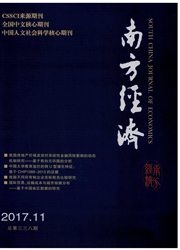

 中文摘要:
中文摘要:
我们对两个竞争性的经济理论假说进行研究,即行业的垄断性究竟为其带来了超额的垄断收益还是由于缺乏竞争或创新激励而阻碍了行业的发展。针对我国上市公司研究发现,与西方国家不同,行业垄断度与公司收益之间存在线性正相关以及非线性的“倒U型”效应,即行业垄断在整体上为公司带来更多的垄断收益,但是这种收益在垄断程度增加到某一临界点之后开始下降,这说明垄断对于公司收益存在“双刃剑”效应。进一步控制企业规模、账面市值比和杠杆比率等行业特征后,结论依然稳健。此外,在考察这种绩效差异是否由市场结构所致时发现,垄断度与未预期收益负相关,这进一步验证了本文结论。
 英文摘要:
英文摘要:
we study two competitive hypotheses of economics theories, namely, whether monopoly brings abnormal return to the firm or blocks the development of the firm due to the shortage of competition and innovation. We focus on the listed companies covered various industries and find out that, opposite to the western countries, there is a positive linear relation and non-linear " converse U" effect between the concentration ratio and the firm return, viz. the monopoly increases monopolistic return of the company. However, when the concentration ratio increases to a certain transition point, the return begins to decrease, which indicates that the monopoly has a "double-edged" effect on the firm return. With a further control of some industry characteristics like size, M/B, leverage ratio, the results are still robust. Besides, in studying whether the difference of the efficiency is caused by the market structure, we find that there is a negative correlation between the concentration ratio and the unexpected return.
 同期刊论文项目
同期刊论文项目
 同项目期刊论文
同项目期刊论文
 Corporate Social Responsibility, Investor Behaviors, and Stock Market Returns: Evidence from a Natur
Corporate Social Responsibility, Investor Behaviors, and Stock Market Returns: Evidence from a Natur 期刊信息
期刊信息
